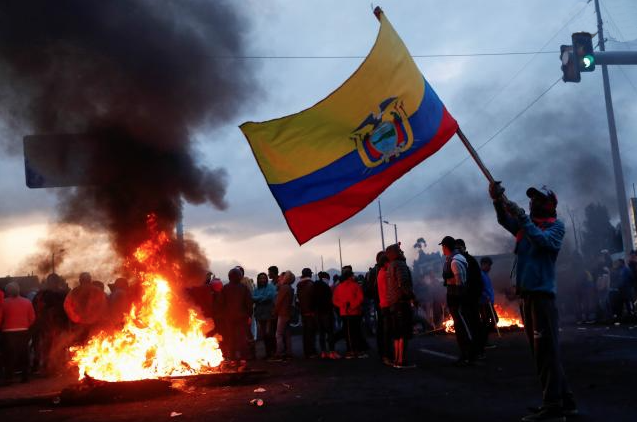May will mark one year of Guillermo Lasso’s government in Ecuador and the first stumbling block for the Executive has been to govern without the support of the Assembly. His political group CREO has had to adapt to a majority of congressmen ranging from the center to the left and with a significant presence of Correism with 48 of the 137 legislators. Meanwhile, the streets are experiencing a wave of demonstrations that includes unprecedented acts of vandalism and a rampant increase in crime and violence.
The main problem of the stagnation the country is experiencing is that the ruling party, CREO, bet on a strategy that personalizes politics without placing in context the inevitable relationship between the Executive and the Legislative. Before the authorities of the Assembly were sworn in, the President rehearsed a political agreement with his two rivals, former President Rafael Correa and the historic leader of the right-wing of the Social Christian Party, Jaime Nebot.
The rejection in social networks, as well as in different sectors was so alarming that Lasso backed off and rather built bridges with the Pachakutik Party, the independents, and the Democratic Left (DL) with the purpose of securing control in the Assembly with the appointment of the authorities. However, none of the moves on the board turned out to be efficient. One year later, the Government has not been able to establish effective links with the opposition or with the natural allies of the right-wing and the old practice of moving majorities persists.
With no major possibilities to maneuver, the President sent to the Assembly his mega economic law which included the Tax Reform, the Investment Law, and the Labor Reform. The project was rejected because Ecuadorian regulations prevent the treatment and approval of three subjects simultaneously when they are urgent.
The Government rethought its strategy and sent one body at a time without having -in the first instance- enough votes, i.e. 70. The Tax Reform Law could enter into force through the Ministry of the Law if there was no agreement among the different blocks, however, with the votes of Correism it passed. This same maneuver was not repeated with the Investment Law which was rejected, which foresees the failure of the Labor Reform. In view of this setback, the President lashed out against Pachakutik assembly members and the leader of the Democratic Left, Xavier Hervas, whom he accused of exchanging favors.
The complexity for the Government to move forward with its National Government Plan, due to the blockage of the Assembly, became more acute when its former Minister of Government, Alexandra Vela, resigned from her position for being in favor of the “Cross Death” – popularly known as the early dissolution of representative powers for Executive’s obstruction. Facing this scenario, Guillermo Lasso emphasized on “governing without the Assembly in the future”, as if that were possible and even worse when he discarded the “Cross Death”.
Now, the Executive is betting on a popular consultation of which nobody knows its content, in a context where its acceptance has dropped and where it faces a scenario of lucubration that reiterates the alliance with its rival Rafael Correa, due to the Habeas Corpus granted to former Vice-President Jorge Glas, despite the fact that he has two sentences for corruption in the Odebrecht case. Loss for the Government, a triumph for the Revolución Ciudadana (Citizen Revolution political coalition).
Against this backdrop, the country is experiencing, in addition to demonstrations, a wave of massacres in prisons, repeated seizures of tons of drugs, and violent deaths under the figure of hired killings on the coast, in the cantons of Durán, Guayaquil, and Samborondón.
So far this year there have been more than 200 violent deaths and insecurity has become the first concern of the population. The climate is even more tense due to the murder of “Don Naza”, a military officer who was involved in the financial pyramid business, where other members of the Armed Forces are also being investigated.
In this context, civil society is gaining strength, in the sense that the acceptance and credibility of the State functions are at the worst levels since the transition to democracy in 1979. The insinuations that “everyone should leave” are recurrent and proposals to improve governance are on the agenda.
In this line, several groups are promoting a popular citizen consultation to ask the population if they agree with the removal of the powers to designate authorities to the Council of Citizen Participation and Social Control, the reform of Chapter V of the Democracy Code regarding the party system, the use of oil surplus for health and social security, and the evaluation of justice operators. There are several proposals that will be submitted to the Constitutional Court.
Amidst the complexities and uncertainties, the Government’s greatest achievement has been vaccination, which makes this administration one of the few that has fulfilled its campaign offer quickly, efficiently, and with international recognition. This revitalizes the economy and restored an important margin of confidence in the future, despite the fact that the economic situation continues to be dramatic since 7 out of 10 Ecuadorians are unemployed.
Another positive aspect is the return to classes at all educational levels and the willingness to implement a public policy to combat chronic child malnutrition. We cannot lose sight of the fact that the Government has not been accused of corruption cases and that is merit among so much impunity. To this, we must add the management in the search for foreign investments.
Translated from Spanish by Janaína Ruviaro da Silva












